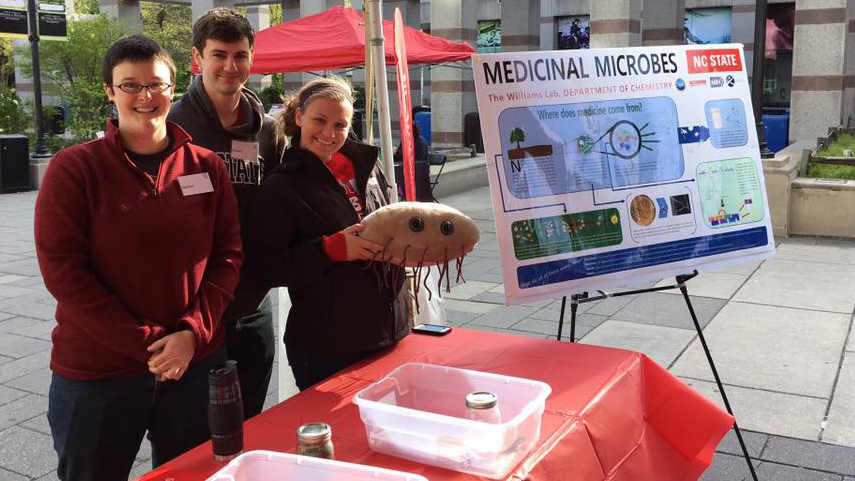Outreach
We share our work with the campus and community to help others understand how chemistry affects us all.

Chemistry in the Community
Chemistry is where all of the sciences come together. It helps you understand the air you breathe, the water you drink, the diseases in your body and everything around you. That’s why we make it a priority to share our work outside the lab.
We host a variety of events, seminars, lectures and symposia that offer opportunities to learn from our researchers and chemistry experts from around the world. We also bring our interactive demonstrations and expertise to both on-campus events, like Packapalooza and State of the Sciences, and off-campus events, like the North Carolina Science Festival and the North Carolina Museum of Natural Sciences Science Cafe series.
Graduate and undergraduate students in our department are encouraged to become public scientists who are passionate about sharing their work. Our faculty use classroom projects like #IHeartChemistryNCSU to help students think about their work in new and creative ways and share it via social media, visual representations or interactive demonstrations. And many of our labs and student groups are involved in outreach and service activities.
Upcoming Events
K-12 Outreach
An appreciation of science built from a young age can stick around for life. Our department invests in the next generation of chemists through a range of K–12 education and outreach programs and events designed to help students experience the importance — and fun — of chemistry.
Our K-12 chemistry education projects include:
- ChemPD (Chemistry Professional Development), a long-running project that helps high school chemistry teachers develop practical, hands-on teaching methods through creative design and scientific discovery. Teachers who are interested in participating should contact Jim Martin.
- NC State Merit Badge College offers hundreds of Boy Scouts the chance to come to campus and earn merit badges in more than a dozen areas of science. The department is very active with this annual event. Contact Jeremiah Feducia for more information or to volunteer.
- Each year, the department hosts high school students through the American Chemical Society’s Project SEED program. The program provides hands-on experience for disadvantaged high school students in the laboratories of research mentors in RTP. Watch a video about the program.
- STARS (Science and Technology Activities in Rural Schools), coordinated by three of the department’s faculty, involves on-site visits to sixth and eighth grade science classes to provide quality science education to underserved schools.